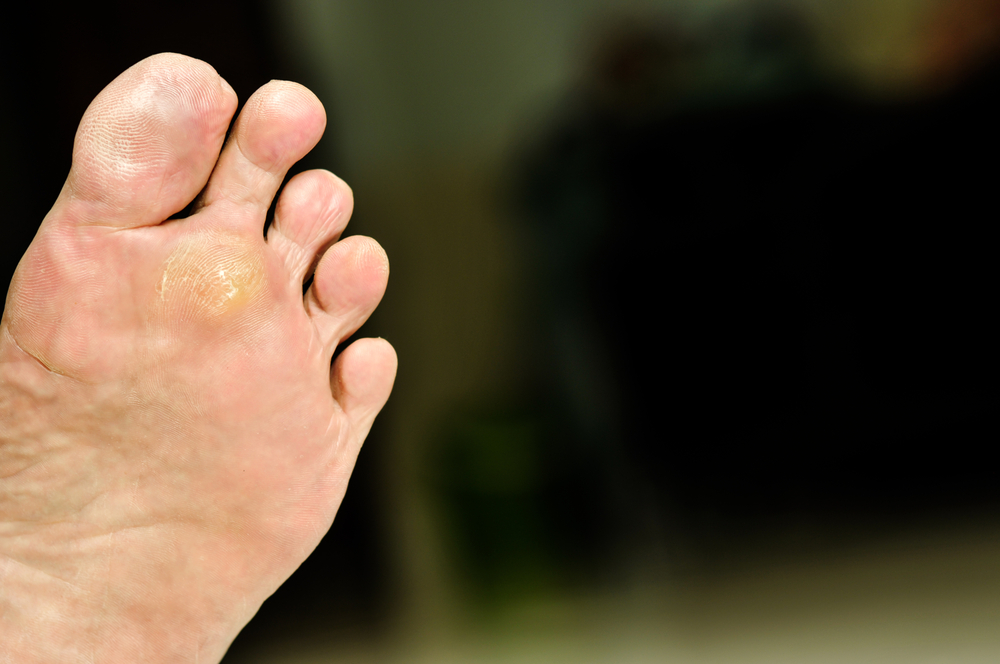December 2019
Many People Have Foot Pain
 The majority of the population may experience foot pain at some point in their lives. It can range from a gentle achiness to severe pain that can be debilitating. Foot pain can be caused by wearing shoes that do not fit correctly, or medical conditions that can include diabetes. A fungal condition may trigger athlete’s foot, and it may cause the toes and the bottom of the foot to itch. This can be managed by using an antifungal powder or spray on the affected foot, in addition to wearing appropriate shoes while in public pools and surrounding areas. A hard lump on the side of the big toe may be indicative of a bunion. This may happen as a result of wearing shoes that do not have ample room for the toes to move freely in. There are numerous reasons why patients have foot pain. If you are experiencing any type of foot pain, it is strongly suggested that you seek the counsel of a podiatrist as quickly as possible so the correct treatment can begin.
The majority of the population may experience foot pain at some point in their lives. It can range from a gentle achiness to severe pain that can be debilitating. Foot pain can be caused by wearing shoes that do not fit correctly, or medical conditions that can include diabetes. A fungal condition may trigger athlete’s foot, and it may cause the toes and the bottom of the foot to itch. This can be managed by using an antifungal powder or spray on the affected foot, in addition to wearing appropriate shoes while in public pools and surrounding areas. A hard lump on the side of the big toe may be indicative of a bunion. This may happen as a result of wearing shoes that do not have ample room for the toes to move freely in. There are numerous reasons why patients have foot pain. If you are experiencing any type of foot pain, it is strongly suggested that you seek the counsel of a podiatrist as quickly as possible so the correct treatment can begin.
Foot Pain
Foot pain can be extremely painful and debilitating. If you have a foot pain, consult with Naim G. Shaheed, DPM from Ankle and Foot Centers of Georgia. Our doctor will assess your condition and provide you with quality foot and ankle treatment.
Causes
Foot pain is a very broad condition that could be caused by one or more ailments. The most common include:
- Bunions
- Hammertoes
- Plantar Fasciitis
- Bone Spurs
- Corns
- Tarsal Tunnel Syndrome
- Ingrown Toenails
- Arthritis (such as Gout, Rheumatoid, and Osteoarthritis)
- Flat Feet
- Injury (from stress fractures, broken toe, foot, ankle, Achilles tendon ruptures, and sprains)
- And more
Diagnosis
To figure out the cause of foot pain, podiatrists utilize several different methods. This can range from simple visual inspections and sensation tests to X-rays and MRI scans. Prior medical history, family medical history, and any recent physical traumatic events will all be taken into consideration for a proper diagnosis.
Treatment
Treatment depends upon the cause of the foot pain. Whether it is resting, staying off the foot, or having surgery; podiatrists have a number of treatment options available for foot pain.
If you have any questions, please feel free to contact one of our offices located in Lithonia/Stonecrest and Emory/Midtown, GA . We offer the newest diagnostic and treatment technologies for all your foot care needs.
Where Does a Plantar Wart Develop?
A plantar wart develops on the bottom of the foot, and is generally in the heel area. It grows into the heel as a result of pressure that is put on the foot as everyday activities are completed. The medical term for this type of wart is known as a verrucae wart, and it is caused by the human papillomavirus (HPV). This type of virus attacks the bottom of the feet, and can cause severe pain and discomfort. A common symptom of a plantar wart can include pain and tenderness while walking, and it may be more noticeable in the morning upon arising. There are a variety of ways to treat this type of wart. These can range from laser therapy, applying salicylic acid cream to the affected area, or possibly using essential oils. If you are afflicted with a plantar wart, it is strongly advised that you seek the counsel of a podiatrist who can guide you toward the proper treatment.
Plantar warts can be very uncomfortable. If you need your feet checked, contact Naim G. Shaheed, DPM from Ankle and Foot Centers of Georgia. Our doctor will assist you with all of your foot and ankle needs.
About Plantar Warts
Plantar warts are the result of HPV, or human papillomavirus, getting into open wounds on the feet. They are mostly found on the heels or balls of the feet.
While plantar warts are generally harmless, those experiencing excessive pain or those suffering from diabetes or a compromised immune system require immediate medical care. Plantar warts are easily diagnosed, usually through scraping off a bit of rough skin or by getting a biopsy.
Symptoms
- Lesions on the bottom of your feet, usually rough and grainy
- Hard or thick callused spots
- Wart seeds, which are small clotted blood vessels that look like little black spots
- Pain, discomfort, or tenderness of your feet when walking or standing
Treatment
- Freezing
- Electric tool removal
- Laser Treatment
- Topical Creams (prescription only)
- Over-the-counter medications
To help prevent developing plantar warts, avoid walking barefoot over abrasive surfaces that can cause cuts or wounds for HPV to get into. Avoiding direct contact with other warts, as well as not picking or rubbing existing warts, can help prevent the further spread of plantar warts. However, if you think you have developed plantar warts, speak to your podiatrist. He or she can diagnose the warts on your feet and recommend the appropriate treatment options.
If you have any questions please feel free to contact one of our offices located in Lithonia/Stonecrest and Emory/Midtown, GA . We offer the newest diagnostic and treatment technologies for all your foot and ankle needs.
Ankle Sprains Are a Common Reason for Ankle Pain
Many types of ankle pain can be caused by an injury, or from various medical conditions that can include arthritis. Research has indicated that ankle sprains are the most common causes of ankle pain. When your foot rolls to one side, the ligaments may become torn or stretched beyond their normal limits. This is known as a lateral sprain, and may take up to two weeks to properly heal. Patients have found that elevating the affected foot may reduce a portion of any existing swelling. Additionally, it is beneficial to wrap the ankle in an elastic bandage, which may provide the necessary support as the healing process takes place. After it is healed, practicing specific stretches can help to strengthen the overall foot. If you have ankle pain for any reason, it is advised that you consult with a podiatrist who can properly diagnosis and treat this type of pain.
Ankle pain can be caused by a number of problems and may be potentially serious. If you have ankle pain, consult with Naim G. Shaheed, DPM from Ankle and Foot Centers of Georgia. Our doctor will assess your condition and provide you with quality foot and ankle treatment.
Ankle pain is any condition that causes pain in the ankle. Due to the fact that the ankle consists of tendons, muscles, bones, and ligaments, ankle pain can come from a number of different conditions.
Causes
The most common causes of ankle pain include:
- Types of arthritis (rheumatoid, osteoarthritis, and gout)
- Ankle sprains
- Broken ankles
- Achilles tendinitis
- Achilles tendon rupture
- Stress fractures
- Bursitis
- Tarsal tunnel syndrome
- Plantar fasciitis
Symptoms
Symptoms of ankle injury vary based upon the condition. Pain may include general pain and discomfort, swelling, aching, redness, bruising, burning or stabbing sensations, and/or loss of sensation.
Diagnosis
Due to the wide variety of potential causes of ankle pain, podiatrists will utilize a number of different methods to properly diagnose ankle pain. This can include asking for personal and family medical histories and of any recent injuries. Further diagnosis may include sensation tests, a physical examination, and potentially x-rays or other imaging tests.
Treatment
Just as the range of causes varies widely, so do treatments. Some more common treatments are rest, ice packs, keeping pressure off the foot, orthotics and braces, medication for inflammation and pain, and surgery.
If you have any questions, please feel free to contact one of our offices located in Lithonia/Stonecrest and Emory/Midtown, GA . We offer the newest diagnostic and treatment technologies for all your foot care needs.
Possible Consequences From Wearing High Heels
 Wearing high heels can be a fashion statement. They can provide additional height, and can make the foot and leg appear slender. As desirable as they are to wear, there may be consequences that come with wearing this type of shoe. Common foot injuries that may result from wearing high heels can include sprained ankles, blisters on the toes or heels, or bunions. Additionally, patients may develop plantar fasciitis, which is an inflammation of the tendon that connects the heel to the toes. There are methods that can be implemented which may help the feet to feel better when high heels are frequently worn. These can include stretching the calf muscles which may help to protect against Achilles tendon injuries, and wearing shoes that have adequate room for the toes to move freely in. Additionally, it may be beneficial to alternate between wearing heels and flats. If you would like additional information about how high heels affect the feet, please consult with a podiatrist.
Wearing high heels can be a fashion statement. They can provide additional height, and can make the foot and leg appear slender. As desirable as they are to wear, there may be consequences that come with wearing this type of shoe. Common foot injuries that may result from wearing high heels can include sprained ankles, blisters on the toes or heels, or bunions. Additionally, patients may develop plantar fasciitis, which is an inflammation of the tendon that connects the heel to the toes. There are methods that can be implemented which may help the feet to feel better when high heels are frequently worn. These can include stretching the calf muscles which may help to protect against Achilles tendon injuries, and wearing shoes that have adequate room for the toes to move freely in. Additionally, it may be beneficial to alternate between wearing heels and flats. If you would like additional information about how high heels affect the feet, please consult with a podiatrist.
High heels have a history of causing foot and ankle problems. If you have any concerns about your feet or ankles, contact Naim G. Shaheed, DPM from Ankle and Foot Centers of Georgia. Our doctor can provide the care you need to keep you pain-free and on your feet.
Effects of High Heels on the Feet
High heels are popular shoes among women because of their many styles and societal appeal. Despite this, high heels can still cause many health problems if worn too frequently.
Which Parts of My Body Will Be Affected by High Heels?
- Ankle Joints
- Achilles Tendon – May shorten and stiffen with prolonged wear
- Balls of the Feet
- Knees – Heels cause the knees to bend constantly, creating stress on them
- Back – They decrease the spine’s ability to absorb shock, which may lead to back pain. The vertebrae of the lower back may compress.
What Kinds of Foot Problems Can Develop from Wearing High Heels?
- Corns
- Calluses
- Hammertoe
- Bunions
- Morton’s Neuroma
- Plantar Fasciitis
How Can I Still Wear High Heels and Maintain Foot Health?
If you want to wear high heeled shoes, make sure that you are not wearing them every day, as this will help prevent long term physical problems. Try wearing thicker heels as opposed to stilettos to distribute weight more evenly across the feet. Always make sure you are wearing the proper shoes for the right occasion, such as sneakers for exercising. If you walk to work, try carrying your heels with you and changing into them once you arrive at work. Adding inserts to your heels can help cushion your feet and absorb shock. Full foot inserts or metatarsal pads are available.
If you have any questions please feel free to contact one of our offices located in Lithonia/Stonecrest and Emory/Midtown, GA . We offer the newest diagnostic and treatment technologies for all your foot and ankle needs.
Possible Causes of Cracked Heels
 The condition that is known as cracked heels often causes pain and discomfort. It can occur as a result of dry skin and will generally affect the outer edges of the heel. If the cracks are deep, they are referred to as fissures. There are several reasons why this condition can develop. These can include standing for long periods of time throughout the day, wearing shoes that have an open back, or existing medical conditions such as psoriasis. Some patients find moderate relief when they soak their feet in warm water, followed by using a good moisturizer that may help to restore soft skin. If you have a severe case of cracked heels, it is advised that you consult with a podiatrist who can offer treatment and relief solution
The condition that is known as cracked heels often causes pain and discomfort. It can occur as a result of dry skin and will generally affect the outer edges of the heel. If the cracks are deep, they are referred to as fissures. There are several reasons why this condition can develop. These can include standing for long periods of time throughout the day, wearing shoes that have an open back, or existing medical conditions such as psoriasis. Some patients find moderate relief when they soak their feet in warm water, followed by using a good moisturizer that may help to restore soft skin. If you have a severe case of cracked heels, it is advised that you consult with a podiatrist who can offer treatment and relief solution
If the skin on your feet starts to crack, you may want to see a podiatrist to find treatment. If you have any concerns, contact Naim G. Shaheed, DPM from Ankle and Foot Centers of Georgia. Our doctor can provide the care you need to keep you pain-free and on your feet.
Cracked Heels
It is important to moisturize your cracked heels in order to prevent pain, bleeding, and infection. The reason cracked heels form is because the skin on the foot is too dry to support the immense pressure placed on them. When the foot expands, the dry skin on the foot begins to split.
Ways to Help Heal Them
- Invest in a good foot cream
- Try Using Petroleum Jelly
- Ease up on Soaps
- Drink Plenty of Water
Ways to Prevent Cracked Heels
- Moisturize After Showering
- Skip a Shower
- Keep Shower Water Lukewarm
- Don’t Scrub Your Feet
If you are unsure how to proceed in treating cracked heels, seek guidance from a podiatrist. Your doctor will help you with any questions or information you may need.
If you have any questions, please feel free to contact one of our offices located in Lithonia/Stonecrest and Emory/Midtown, GA . We offer the newest diagnostic and treatment technologies for all your foot care needs.











